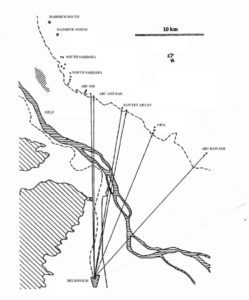 Part of what I love most about research is the stunning discoveries that come with every project.
Part of what I love most about research is the stunning discoveries that come with every project.
I never dreamed high-priest Jehoiada was in his mid-nineties when he married 16-year-old Jehosheba. (Ewww!) Together, they saved King David’s lineage from Queen Athaliah’s murderous rampage (see 2 Kings 11; In the Shadow of Jezebel).
Who’d have thought Jacob’s daughter, Dinah, was a contemporary of Job? She may have even lived in Ur during his testing (see Gen. 34, 36; Love Amid the Ashes)!
Discoveries About Joseph’s Time Frame
Would you like to know what startling discoveries I made while writing Joseph’s story—for both Potiphar’s Wife and In Feast or Famine? Here are a few highlights about Potiphar’s Wife or you can CLICK HERE archived blog posts to skim more “ah-hah” details:
- Several scholars admitted it was impossible to prove the exact date of Joseph’s sojourn in Egypt.
- Genesis 48:22 confirmed that Jacob himself had driven out Amorites with his own sword and made me settled with placing Joseph in Egypt during the Hyksos Dynasty. The Hyksos were foreign Pharaohs (sometimes called, Amu, thought to mean Amorites) who had been forced out of Canaan.
- The Hyksos split Egypt into two nations when they overthrew the Egyptian government in Memphis, moved their capital to the Nile Delta, and ruled Lower Egypt in the north. An Egyptian pharaoh ruled Upper Egypt from the far south in Thebes.
- One of my most interesting medical discoveries was the treatment for “hysteria”—what we today call mental illness. Because mostly women were diagnosed with the condition, the priests who treated them fumigated the uterus. It was a painful process in which . . . well, let’s just say they blamed women’s hormones. Interesting, but very sad.
- The Hyksos’ greatest contribution to Egyptian culture was the lasting use of chariots and composite bows even after Egyptian rulers drove out the Hyksos a few centuries later.
Discoveries About Asenath and Egypt’s Priesthood
Why—out of all the single women in Egypt—did Pharaoh choose the daughter of Potiphera, high priest of On, to present to Joseph as a wife? For that answer, you’ll have to read In Feast or Famine, but I learned so much while researching Asenath, Egypt’s gods, the priestly hierarchy, and the temples’ various structures.
- Ancient architects built very Egyptian temple as a replica of the universe and creation. Visitors moved from the open, outer courts downhill and into the growing darkness of the primeval creative hill (holy of holies) where the god’s image dwelt and only Pharaoh and the high priest could enter.
- Other sacred staff could progress according to the hierarchy of their position. They “hypostyle hall” (built with rows and rows of columns) mimicked the reeds surrounding the primordial hill. The floor sloped down and ceilings lowered as congregants progressed closer to the close, dark world of the god’s inner sanctum.
-

TY – JOUR
AU – Magli, Giulio
PY – 2007/08/27
SN – 978-3-7643-8973-4
T1 – Akhet Khufu: Archaeo-astronomical Hints at a Common Project of the Two Main Pyramids of Giza, Egypt
VL – 11
DO – 10.1007/978-3-7643-8974-1_4
JO – Nexus Network JournalFew women were given official titles in any temple. Chantress and Wife of Amun were the exceptions. Very little is recorded of their specific duties, so much of what I wrote was fiction; however, some of Asenath’s chants were adapted from ancient Egyptian prayers.
- One of the most fascinating discoveries was the hotly debated “solar alignment phenomenon.” Some say twice a year the sun shines through the top tower of On’s temple (also called Heliopolis in Greek) and intersects with the pinnacle of 4-5 of Egypt’s most ancient pyramids—some hundreds of miles away. The POWER of RA, the sun god of On’s temple, was uncontested and his favor highly sought.
Discoveries About Joseph’s Tough Job
Sometimes we think Joseph interpreted Pharaoh’s dreams and—poof! His life was suddenly perfect! The gifts Pharaoh gave him were well-thought-out, as was the wife he chose, and Joseph’s tour through Egypt in Pharaoh’s own chariot.
- Joseph was a detestable Hebrew, remember?
“Egyptians could not eat with Hebrews, for that is detestable to Egyptians.” Genesis 43:32 (emphasis added)
- Pharaoh gave Joseph the daughter of On’s high priest because he knew his Hebrew vizier would need to that connection to the most powerful god in the land. Yes, Pharaoh recognized the spirit of a god on Joseph (Gen. 41:38), but he also recognized the racial bias Joseph would face when he traveled throughout the WHOLE land of Egypt—Lower and Upper, among the Hyksos and full-blooded, angry Egyptians.
- I also learned a lot about what would happen to the LAND during excessive “abundance” of Nile flooding. Too much water does as much damage as too little! Besides figuring out how to store the added crop yields, Joseph would have needed to control the extra flooding!
- My discoveries about drought and famine were horrific. Here are just a few of the consequences I hadn’t considered:
- Increased fires
- Increased disease
- Increased predator aggression (animals seeking food)
- Increased Nile acidity
- What These Discoveries Taught Me
Discoveries About Myself
I remember, while reading God’s Word and digging into research, that nothing is coincidental.
- God’s sovereign hand guides it all though every human remains free to choose. Incredible!
As I learned more about the REAL people in their cultural context, it helped me dive deeper into their biblical world.
- I realized they were people who felt deep emotions just like me. They got discouraged and needed to press through hard times. Asenath was undoubtedly nervous when she met a man chosen for her to marry. At some point, they may have felt infatuated, giddy, angry, disappointed, confused, overwhelmed. Ultimately, certainly, both Asenath and Joseph experienced the wonder of God’s working on their behalf.
- But I also realized they needed to live one day at a time. Though I read the miracles quickly, a chapter or page of Genesis covers years of their lives. Amid the daily grind of hard decisions, blistered hands, and surly elders, they–like us–had to make a conscious effort to thank God, to worship and praise Him.
Even when they didn’t feel like it.
Even when they still had questions about other gods/religions.
Even when their prayers went unanswered.
Today’s Questions:
- Which of the research discoveries were especially interesting to you? Did anything nudge you toward a new spiritual insight?
Tweet-ables:
- Learning more about the culture and context of REAL Bible people helps me dive deeper into understanding what God is teaching ME through them.
- Writing Joseph and Asenath’s story helped me realize they had to live one day at a time and make a conscious decision to worship God. Like us.



